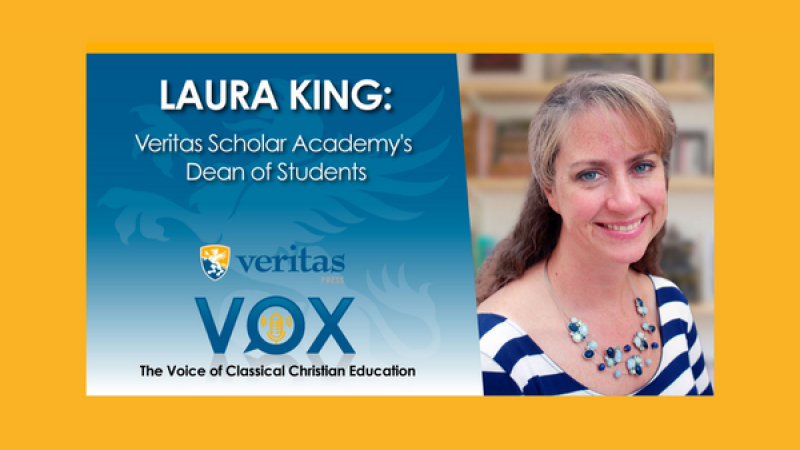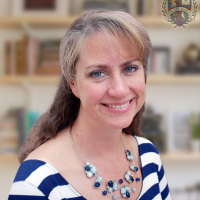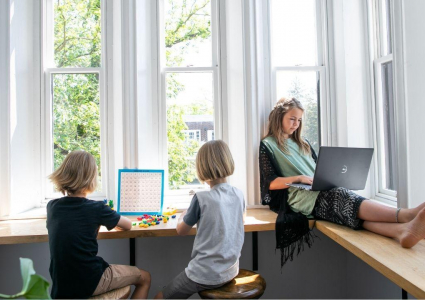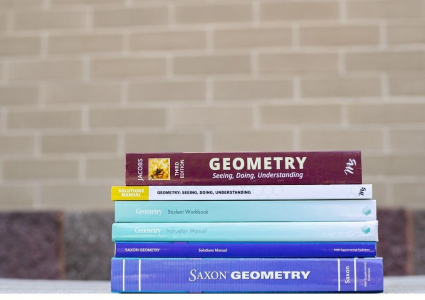Laura King: Veritas Scholars Academy's Dean of Students

Listen on Apple Podcasts | Listen on Spotify | Watch the Video
Did you ever think that an online school could still have things like clubs, school trips, and student government? Today, learn about these and other ways that students can grow, expand their high school experiences, and build a vibrant community - all while doing online classes from wherever they call home! Laura King, the Dean of Students at Veritas Scholars Academy is here to share how your students can be connected to their classmates from far away.
Episode Transcription
Note: This transcription may vary from the words used in the original episode for better readability.
Marlin Detweiler:
Welcome again to Veritas Vox, the voice of classical Christian education. Today we have our own Laura King with us. Welcome, Laura.
Laura King:
Thank you for allowing me to come!
Marlin Detweiler:
Well, we're sure glad to have you here. Tell us briefly how you became familiar with Veritas Press.
Laura King:
Okay. In 2008, I became a founding teacher at a brick-and-mortar classical school in our town. And we used a lot of Veritas curriculum. So I started off as a K–2 teacher. So I did the history of Egypt through, you know, the Old Testament, through the fall of ancient Egypt. And then, the following year, I taught the third graders. So I was very familiar with the history curriculum. And as I started to grow into the school, I also heard a lot about Omnibus. I was very excited about potentially one day to teach Omnibus. And then, as time passed, I ended up becoming the headmaster at that brick-and-mortar school. And so I attended some conferences.
Marlin Detweiler:
And that’s in Albuquerque. What’s the name of the school again?
Laura King:
It's Imago Dei Academy, and it's actually in Alamogordo. So we're in southern New Mexico.
Marlin Detweiler:
Ah! I've never been to Albuquerque, let alone the town you just mentioned. I don't think I could pronounce it without hearing it a couple of times.
Laura King:
Just means fat Cottonwood. So for whatever that's worth. But anyway, as headmaster of the school, I attended some conferences, and while attending a conference, I was standing at the Veritas display with one of our board members. And one of the Veritas members came up and just simply asked, “Do you know anyone who would be interested in teaching a literature class for us?”
So at that point, I didn't even know that Veritas was an online school, and my ears perked up immediately. I was so excited at this opportunity. And so for several years, I actually would teach very early in the morning my time, I would close my Veritas computer after class was over, and I would open up my other computer and proceed with my duties as headmaster for the brick-and-mortar school.
But fast forward several years– so that started in 2011. Fast forward several years. I have been praying a lot about coming full-time with Veritas, and the Lord just made the path very clear. And so here I am full-time.
Marlin Detweiler:
And tell us what you do. I know. So this isn't for me. You tell everybody else.
Laura King:
I teach several classes at multiple different levels. I've had multiple classes over the years, and I'm also the Dean of Students. So half and half.
Marlin Detweiler:
What are you teaching currently?
Laura King:
Currently. Literature 5, Literature Transition, and Grammar and Writing Transition.
Marlin Detweiler:
Wonderful. Now tell our audience what it means to be the Dean of Students for Veritas Scholars Academy.
Laura King:
Well, my role as Dean covers a plethora of different tasks. Most of it is dealing one on one or in groups with the students. So I oversee the student mentors, the student moderators, the student government students. And aside from that, we also work on planning school trips. I also have input with educational accommodations, and disciplinary action forms, which is not my favorite part of the job, but it does come with it. So that's the main focus of the day.
Marlin Detweiler:
You can't take just the good. You got to handle the difficult stuff!
Laura King:
I know, I know. But thankfully, there are very rare occasions when I have to deal with that. So that's good.
Marlin Detweiler:
You mentioned a couple of terms that probably need to be unpacked a bit. You mentioned moderators, and you mentioned that what was the other one starts with an “m”?.
Laura King:
The mentors.
Marlin Detweiler:
Mentors and, of course, class officers. Talk to us. Well, let's take mentors first. What is a student mentor at VSA?
Laura King:
Student mentors are students who go through an application process. And once they are vetted out through interviews and recommendations, they actually help run the student help desk. So if students call the Help desk and they're not sure what to do about tech issues, maybe they forgot their password. They will help them with that.
But that help desk is also there for students who are struggling. Maybe there are students who need study tips or maybe students questioning some different spiritual aspects. Those students are there to help guide them. And then I'm in the background in case any situations come up that go beyond what the student mentors should be handling. So I help with that.
Marlin Detweiler:
How many of them are there currently?
Laura King:
There are about 15 mentors. So it's a good, solid team this year. That way, they're not spending all of their time on the Help Desk because they are committed to their studies, of course.
Marlin Detweiler:
And what does a student moderator do?
Laura King:
So, moderators manage the discussion boards that come up in Schoology. So Schoology has what we call Student Commons, and it's divided between third through fifth graders.
Marlin Detweiler:
Well, let's take let me pause for just a second. Recognizing terms that listeners may not know. Schoology is our learning management system.
Laura King:
Yes.
Marlin Detweiler:
For student conversation and for parent and teacher conversations to happen.
Laura King:
It's also where students find assignments, upload different work that they do, and things like that. But those discussion boards are really a great place for students to find community. They have their classroom, and they go on webcam and class, but they're only limited to the students that they have in class with them. So the Student Commons, it's that kind of area for discussions they post, you know, funny links to different graphics. They have debatable conversations on there, not debatable, but debating in a positive manner! Don't want to make it sound like anything it shouldn't be, but it's divided between 3-5th graders, 6-8th graders, and then high school students.
So the moderators are the ones who are watching all of those conversations. They're just making sure that's what posted on there is God-honoring and that if there is a topic of debate, they will– they're trying to promote students to be able to debate in a wise manner, but respectfully. So they just exactly they watch those conversations. And then, you know, if there's anything that comes up that needs to be addressed, they handle it within their scope. And if something goes beyond that, they contact me. And so I step in and help out a little bit with that as well.
Marlin Detweiler:
Very good. And then, of course, you mentioned class officers. Tell us about the class officers and what they do and what they don't do.
Laura King:
Okay. So it's hard for some people to understand that you can have class officers in a virtual environment. So it doesn't look the same as it might in a brick-and-mortar school. They're not going with the platform of having a soda, you know, a soda machine in the hallway or trying to get school lunches changed. Those aren't the topics that we deal with.
Marlin Detweiler:
I haven’t seen any yard signs when they were trying to get votes, either.
Laura King:
No, no, no, no! No flamingos in the yard, you know, anything like that. But our full-time students in high school actually started in seventh grade on are eligible to look at campaign ideas. You know, what are some of the things that they would like to see change in their own groups, in their own classes. And a lot of those deal with community.
Again, it's not about the soda machine. It's about, you know, what kind of activities can we do to bring our entire class together as a unit, to have fun together, to be able to have that fellowship. And so it's a fun circumstance to watch as they go through these platforms in these different ideas. They actually have to go through a campaign and voting process.
And then once they are elected, there's a student, there's a president, a vice president, and a secretary for each of those grades. And they have two meetings a month. And those meetings are focused on growing together spiritually. They will often post Bible studies that the students will study before they come to the meeting, and then they also play games. They watch movies together. It's just a really neat way to build that unity within each group.
Marlin Detweiler:
They're also involved, and I know that you are in some of the extracurricular things, extracurricular activities that we have; and I think that people would be surprised and would enjoy learning the vast number of extracurriculars that we're able to do even though online. So tell us about some of those. I don't know if you have the ability to list all of them off the top of your head or from anything you might have at your fingertips.
But tell us about the extracurricular activities, clubs and that sort of thing and how those come about and how they're executed.
Laura King:
Well, I think we just start with the basics, and we've already discussed Student Commons. That is considered an extracurricular. It's not a mandatory activity. Students are able to come and go as they would like. They can spend as much time as their parents allow or as little time as they would like on that platform getting to know one another.
And then, of course, we do have the Commons, the Connections Officers or the student body president, the student officers. They have their meetings, and then we also have clubs. I was actually surprised when I looked at our list of clubs that we have running right now, and we have approximately 400 students enrolled currently, and the different club offerings that we have, which I thought was pretty amazing.
And the clubs are run by different Veritas staff. So the teachers come in, they have an interest. They find a group of students that have similar interests, and we're able to have those clubs anywhere from apologetics to the yearbook to chess to the polyglot club, music, photography, and so on.
Marlin Detweiler:
What's the Polyglot club?
Laura King:
That is a fantastic question. I am I'm not sure, actually, but they're there. I think we'll have to find that out there.
Marlin Detweiler:
One of the things that's really become that the Internet has made possible is to play games like chess across space. I can play chess with somebody that’s not in the same room with me. My understanding is that we've had some pretty impressive people involved in that. What can you tell us about the chess club?
Laura King:
To be honest, I am unfamiliar with that by stepping into the Dean of Students for the first time this semester. I know that we have some pretty incredible people that are running it, but as far as how they actually execute all of that, I am I'm really not sure I would have to attend and see how that works!
Marlin Detweiler:
Fair enough. Fair enough. Didn't mean to put you on the spot.
Laura King:
No, that's okay!
Marlin Detweiler:
But I know that we have an organization behind it running it that is that was involved in helping to consult for a movie that was done about chess not too long ago, and that they have some real talented people involved. And I think we have some pretty talented award-winning or competition-winning chess players within the student body too.
What do you say– you're now just a few months into the role of Dean of Students. You did some of it part-time. When did you first start doing it? Was it about a year and a half ago?
Laura King:
So last year I was considered the Student Life Advisor. And what I did in that role was primarily deal with Student Commons and the Student Connections, and that was really all I managed. So that was prior to the other.
Marlin Detweiler:
The full time, right?
Laura King:
Exactly.
Marlin Detweiler:
So now you're involved in– give us all the areas that you're involved in, because there are some that haven't been mentioned yet, I'm sure.
Laura King:
So primarily the student moderators and mentors and student government students. So really helping to counsel them. We do some leadership lessons and talk about, you know, how to build unity in those things. I also deal with educational accommodations, student discipline, student travel. And then also the community groups, which is something that I know that has been, you know, we've tried that multiple times in the past, and now we're resurrecting that with a new a new approach to it. So pretty excited about the community groups.
Marlin Detweiler:
Yeah, wonderful. You didn't mention alumni, as I understand it; that's also an aspect that I understand that it may still be out in front of you in terms of taking initiative, but what are your thoughts on how we interact with our alumni?
Laura King:
So I was really surprised when I went to End of Year Gathering last year for the first time, and I saw the way the seniors, in particular, interacted with one another. I knew that they would have some level of bond between them just having been in classes together for multiple years. But when I saw them hanging out and just really enjoying one another's company at End of Year Gathering, it made me wonder, you know, what would it be like if we could have some reunions, you know, coming into End of Year Gathering.
So as I thought about that, you know, a couple of the alumni did show up to one of the activities, and it was so exciting for all of them. And I thought, “You know what? That would be great to have an activity for alumni.” So I know that you have a very strong heart for alumni, making connections with them, seeing what they're up to, seeing how Veritas can reach out and serve them.
So right now are in the process of just trying to find a good connection with them, trying to find good ways to communicate with them. So I've been reaching out to the alumni and their parents and other students to try to get good contact information so that we can include them in activities in your future End of Year Gathering, that we can also include them in the different aspects that we want to as we grow Veritas and the heart, especially that you have for them.
Marlin Detweiler:
Yeah, well, you know, one of the things that has been my experience with my being an alum of my university, which I won't mention because I'm going to be critical, is that the only time I hear from is when they ask for money. And we have made a determination as we interact with the alumni that we want to figure out how to continue to further our mission with– we have this mission of restoring culture of Christ, one young heart in mind at a time that doesn't get completely fulfilled when students graduate from high school.
And we want to be able to further help that mission by thinking about and acting on good ideas about how we can help alumni in that. And that's something that I've given a good bit of thought to. And I know you're starting to become part of that conversation too because that's really how we affect our culture in the ways that we want to.
As they start families, as they start businesses, as they go to work and have employer-employee relationships, they of relationships in their communities and churches, all those kinds of things are part of what we want to see, how we can be helpful to them through that process. So I look forward to working further with you and Dr. Cannon and others on that.
What do you find most rewarding about what you do at this point? I realize it’s not very long into it, and this answer might change a few times in the future, but what do you find most rewarding at this point?
Laura King:
I don't think it's going to change. And I don't want it to sound cliche, but I love the students. I just love interacting with them. You know, I don't like seeing them struggle with different things when that happens, but I really enjoy being able to have that connection with them. And this position has allowed me to touch a larger group of students than I would have ever had just in the classroom.
So I didn't even know prior to being Student Life Advisor last year, I didn't even know about the mentor program or moderators. I had never heard of that before. So it's just opened my eyes. We have some really incredible students, and it's a privilege to be able to meet them where I would never have been able to before.
Marlin Detweiler:
Yeah, we had a few weeks ago, we had I interviewed the Ericksons who were talking about going to the End Of Year Gathering, and I have a story that I, I took a risk. There was a businessman in my office a few years ago– probably seven or eight at this point. And we were talking about the company that he represented doing some things that would help benefit Veritas, and I wanted him to get a sense of how impactful what we were doing is.
And so I said, “You're not far away from the Eden Resort where we were holding the main part or where is kind of the central part of central point for the End of Year Gathering. If you leave my office, I'd love for you to take some time and just go over to the lobby, introduce yourself to some of the students that you see there and just talk to them, and you will find a quality of a student, of godliness, of poise, of conversational ability and interaction you've never experienced before.”
And he took me up on it and he went over there and he was not disappointed. It was remarkable. And we are just blessed with incredible students. I think that the parents that we have the pleasure to work with are exceptional for having raised kids like that. I think the teachers contribute to that.
Marlin Detweiler:
And you're playing a role in it, too, now. Thank you.
Laura King:
It's a privilege.
Marlin Detweiler:
What are one of the things we see in the online school- Of course, registrations right around the corner for most people, and people come to us, and they take a class. They have students that take a class or two all the way up to being a full-time diploma student. Tell me what some of the benefits are of taking classes and of course, the benefits of being a full-time student in our diploma program.
Laura King:
So certainly at any level, taking a course with Veritas, you have academic rigor, which some students don't see that as a blessing, but they do grow to appreciate it! I have several students this year who started off the beginning of the year, and they were very worried and they just felt like they couldn't do it. But as time has passed, I realized that they can do it. They find that confidence, and they start to really love it. They love the challenge of it. And they get to meet students from all over the world.
As I had mentioned before, I am now working with students I would have never met before. They, the students at all levels are able to just become influenced by and influence other students from all over. They get to interact with them in a very unique environment that is very, very homey, even though it's online. One of the things that I faced when I was talking about coming to Veritas full-time, I had people say, “How can you teach online? That's not teaching. It's not a classroom.” And it's just not can be further from the truth. Being online is just as much like a physical classroom, except that you don't have students asking to go to the bathroom all the time or dropping their pencil on the floor. If that happens, you just keep going. We don't even know about it.
Now, the full-time students, the full-time students have a really unique relationship. So first of all, our diploma students. And so that's what full-time students are. They are diploma students. They get to work with some really phenomenal Academic Advisors. And those Academic Advisors basically walk with them and their families through every level of their education. They help them choose their course load. They help them choose the different curricula that they're looking at. They're able to the students are able to register early for classes, which gives them kind of the optimal schedule, too. So there are a lot of just logistical day-to-day benefits of being a full-time student. Those are also the students who are eligible to run for student government. Those Academic Advisors also work with them on college applications, even finding the right college for them, going through resumes and interview processes.
Those Academic Advisors are just really– I'm impressed by them more and more as the weeks go on. And so these students get to have that very customized perception or perspective, I should say, from those Academic Advisors, and then they get to have graduation for the students who can make it to End of Year Gathering. You know, a lot of graduates what they want to do is they want to walk down the aisle. They want to have the tassel that they move from one side to the other, and they want to have a diploma that they can hold in their hands. And that's something that we provide for them. So they have an accredited transcript. They have no problem getting into the universities that they're seeking. And they have that really hands-on approach from other people that are going to help guide them through this whole process.
Marlin Detweiler:
As you think about the future, what do you hope to see in your involvement at Veritas ten or even 20 years from now? What are your dreams for what you see?
Laura King:
How old am I? 20 years from now.
Marlin Detweiler:
You'll be probably 45 in 20 years.
Laura King:
Oh, of course! Of course! And genuinely students to understand what they believe and why they believe it, so that when they leave the classroom when they leave these teachers that they love so much and their advisors that they love so much, and the other, you know, the community that they build within the school. But when they do step out of our virtual doors, they actually know who God is and they know who they are in relation to him.
They know how much he loves them and how much he gave for them and how they can take what they've been blessed with and they can share that with others. So, you know, the mission of the school is to impact one young heart and mind at a time for Christ. And that's really what we need to see because there's so much surface-level religion. There's so much checking boxes just to say that we've done our devotion or we prayed for the day. But what I hope to see is just this culture that comes out of our school where these students love the Lord.
Marlin Detweiler:
Yeah! One of the things that I think we are so far removed from the last time classical Christian education had a significant impact– we’re so far removed, generations removed from appreciating and understanding its impact that we are very quick to assume that it's a nice thing, it's a good thing. It's a thing that the students are better educated by having read Homer and Herodotus and Theusidites, and you name the person from antiquity whose writings have survived, but it wasn't always the case, that that was simply thought of as a wonderful intellectual exercise.
When you look at the Apostle Paul and what he writes about his education and his experience, he recognizes it of great significance in how it put him where he did. And yet he also recognizes that it is, in a sense, meaningless ultimately because of the gospel, but it's not meaningless in the way that we tend to think of it, that it doesn't impact who he is, but rather in relative importance.
And we tend to dismiss things on one side or the other. Either we want to be heady and really good people who are well-educated by some modern definition, or we want to dismiss it and say it's just about Jesus. But the fact of the matter is, both of them get it wrong. And what we're after is somebody who is completely connected to what we like to call sometimes the great conversation and understanding what's happened in history and recognize that all of that is God's work in Providence, brings us to where we are today and gives us an opportunity to be his Vice Regents in his creation. Seeing the impact, the phrase that I've been recently attracted to again and more and maybe, even more, is “Thy kingdom come on Earth as it is in heaven,” and it is part of classical Christian education, is part of making that happen, helps provide informed students who become articulate and effective adults.
Any other thoughts before we call it a day here? You've been very gracious, and I love the work you're doing, so thank you. But other things do you want to tell us about them? I may not have asked.
Laura King:
No, I appreciate it! I would just really encourage parents to look into the diploma program as registration is coming up. You know, sometimes students may be concerned about workload, but if you allow them to blossom within classical education, it's just phenomenal to see how much they grow even in a short period of time. So I just want to encourage parents mostly to stick with it and to really look forward and look to the future to see how much they're going to reap the benefits.
Marlin Detweiler:
I can tell you when I watch– and Bob reports on the retention of students, it is amazing to me how high the retention rate is of people who are in the Diploma Program continuing. It truly is amazing and speaks to exactly what you're saying. Laura, thank you so much for your time today. For joining me. I promised you no hostile questions, and I live up to my promise.
Laura King:
Yes, you did!
Marlin Detweiler:
Thanks. This is Veritas Vox, the voice of classical Christian education. Laura King has been our guest today, our Dean of Students. Thank you, Laura.
Laura King:
Thank you!







